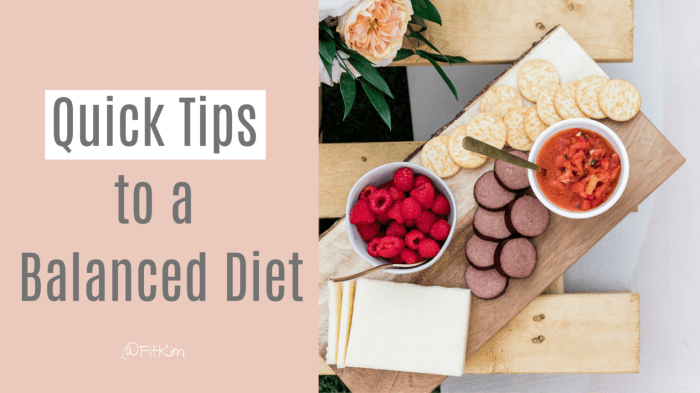Balanced Diet Tips are your secret weapon for a healthier lifestyle, packed with all the juicy details you need to know. From the importance of a balanced diet to tips for achieving it, get ready to dive deep into the world of nutritious goodness.
Get ready to discover the ultimate guide to eating right and feeling amazing, all while keeping it cool and trendy like your favorite high school hip style icons.
Importance of a Balanced Diet
Maintaining a balanced diet is essential for overall health and well-being. It provides the necessary nutrients and energy our bodies need to function optimally and stay healthy.
Key Components of a Balanced Diet
- Proteins: Essential for muscle growth and repair.
- Carbohydrates: Main source of energy for the body.
- Fruits and Vegetables: Rich in vitamins, minerals, and antioxidants.
- Dairy: Important for bone health and a source of calcium.
- Healthy Fats: Necessary for brain function and hormone production.
Impact of a Balanced Diet on Energy Levels and Mental Well-being
Eating a balanced diet can significantly impact our energy levels and mental well-being. When we fuel our bodies with the right nutrients, we have sustained energy throughout the day and improved cognitive function. A diet rich in fruits, vegetables, whole grains, and lean proteins can help boost mood and reduce the risk of mental health issues.
Tips for Achieving a Balanced Diet

Eating a balanced diet is essential for maintaining good health and overall well-being. Here are some tips to help you achieve a balanced diet:
Include a Variety of Food Groups, Balanced Diet Tips
One key tip for achieving a balanced diet is to include a variety of food groups in your meals. This ensures that you are getting a wide range of nutrients that your body needs to function properly. Some examples of food groups to include are:
- Fruits and vegetables: These are rich in vitamins, minerals, and fiber.
- Protein sources: Include lean meats, poultry, fish, eggs, nuts, and legumes.
- Whole grains: Opt for whole grain bread, rice, pasta, and cereals for fiber and essential nutrients.
- Dairy or dairy alternatives: Choose low-fat dairy products or fortified plant-based alternatives for calcium and vitamin D.
Meal Planning Strategies
Meal planning can help you ensure that you are consuming a balanced intake of nutrients throughout the day. Here are some strategies to consider:
- Plan your meals in advance to include a variety of food groups.
- Prepare healthy snacks to have on hand when hunger strikes.
- Consider batch cooking or meal prepping to save time during busy weekdays.
- Use smaller plates to help with portion control and avoid overeating.
Portion Control and Moderation
While it’s important to include a variety of food groups in your diet, it’s also crucial to practice portion control and moderation. Here are some tips to help you maintain a balanced diet:
- Aim to fill half your plate with fruits and vegetables, a quarter with lean protein, and a quarter with whole grains.
- Avoid supersized portions and listen to your body’s hunger cues.
- Limit foods high in added sugars, saturated fats, and sodium.
- Enjoy treats in moderation and focus on overall balance in your diet.
Nutrient-Rich Foods to Include
In order to maintain a balanced diet, it is crucial to incorporate a variety of nutrient-rich foods that provide essential vitamins and minerals for overall health and well-being. By including a range of fruits, vegetables, lean proteins, and whole grains in your meals, you can ensure that your body receives the necessary nutrients to function optimally.
Fruits and Vegetables
Including a variety of fruits and vegetables in your diet is essential for obtaining important vitamins, minerals, and antioxidants that support the immune system, promote healthy digestion, and reduce the risk of chronic diseases. Different colored fruits and vegetables offer a diverse range of nutrients, so aim to include a rainbow of produce such as berries, leafy greens, citrus fruits, and cruciferous vegetables like broccoli and cauliflower.
Lean Proteins
Lean proteins are vital for muscle maintenance, repair, and growth, as well as for proper hormone production and enzyme function in the body. Opt for lean sources of protein such as skinless poultry, fish, tofu, legumes, and low-fat dairy products. These foods provide essential amino acids that are necessary for various bodily functions and overall health.
Whole Grains
Whole grains are rich in fiber, vitamins, and minerals that help regulate blood sugar levels, promote digestive health, and reduce the risk of heart disease. Incorporate whole grains such as quinoa, brown rice, oats, and whole wheat bread into your meals to provide sustained energy and support overall well-being.
Hydration and Balanced Diet: Balanced Diet Tips

Maintaining proper hydration is essential for a balanced diet and overall well-being. Water plays a crucial role in various bodily functions and is vital for maintaining good health.
Tips for Staying Hydrated
- Carry a reusable water bottle with you throughout the day to ensure easy access to water.
- Set reminders on your phone or use hydration tracking apps to help you stay on top of your water intake.
- Drink water before and after meals to aid digestion and keep your body hydrated.
- Include hydrating foods in your diet, such as fruits and vegetables with high water content.
Impact of Hydration on Health
Staying hydrated has a significant impact on your overall health and well-being. Dehydration can lead to various health issues, including fatigue, headaches, and poor concentration.
Proper hydration helps maintain healthy skin, aids in digestion, regulates body temperature, and supports overall bodily functions.